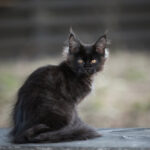Hybrid Cats, breeds resulting from crossing domestic cats with wild felines, have gained popularity for their exotic looks and unique personalities. Breeds like Bengals and Savannahs promise a touch of the wild in your home, but the reality of owning a hybrid cat can be far more complex than advertised. While undeniably beautiful and captivating, it’s crucial to understand the potential challenges and ethical considerations before considering a hybrid cat as a pet. This article delves into the experiences of hybrid cat owners, highlighting the realities – both positive and negative – of living with these fascinating animals.
What Exactly Are Hybrid Cats?
Hybrid cats are the offspring of domestic cats crossed with wild cat species. The most common and well-known hybrid breeds include Bengals (domestic cat crossed with Asian Leopard Cat) and Savannahs (domestic cat crossed with Serval). These crosses are typically denoted by “filial” generations (F1, F2, F3, etc.), indicating how many generations removed the cat is from its wild ancestor. Earlier generations (F1, F2) are closer to their wild heritage and often exhibit more pronounced wild traits.
The Allure of the Exotic: Why Hybrid Cats Are Appealing
The appeal of hybrid cats is undeniable. Their striking coats, often featuring spots and rosettes reminiscent of their wild ancestors, are visually stunning. Breeders often promote them as intelligent, active, and affectionate companions, promising a pet that is both exotic and manageable. For many, the idea of owning a cat that looks like a miniature leopard or serval is incredibly attractive.
The Less Glamorous Side: Challenges and Concerns of Hybrid Cat Ownership
However, the experiences shared by hybrid cat owners often paint a different picture, one that goes beyond the glossy brochures and appealing descriptions. Many owners encounter significant challenges that stem from the inherent wild instincts still present in these animals.
Behavioral Issues: A Wild Card in Your Living Room
One of the most frequently reported issues is behavioral problems. Despite being generations removed from their wild ancestors, hybrid cats can retain strong territorial instincts and exhibit behaviors that are challenging for typical domestic households.
-
Aggression and Territoriality: Stories like Amelia and Mark’s experience with Ceci, a Bengal, are not uncommon. Ceci’s unprovoked biting and scratching, territorial aggression towards guests, and constant need for supervision highlight the challenges of managing a cat with strong wild instincts. Jenni and Dan’s Bengal-Tabby mix also demonstrates similar aggressive tendencies, attacking both family members and neighbors. These behaviors can make it difficult to have visitors and create a stressful living environment.
-
Inappropriate Elimination: Harpo, Nicole S.’s F3 Bengal, developed a persistent problem with inappropriate urination. Despite a clean litter box and being neutered, Harpo continued to urinate outside the litter box for over a year. This issue, while not exclusive to hybrids, can be more pronounced and difficult to resolve due to underlying stress or territorial marking behaviors linked to their wild ancestry.
-
“Love Bites” and Handling Sensitivity: Jenni and Dan were warned about “love bites” with their Bengal mix, but quickly realized these bites were far from gentle and could be quite painful. The stories consistently mention a sensitivity to handling and petting, where overstimulation can quickly lead to biting or scratching.
Health Concerns: A Potential Genetic Lottery
Beyond behavioral issues, health problems can also be a significant concern. Louis, mentioned at the beginning of this article, a Bengal owned by Brian, developed oral cancer at a relatively young age of 12. While not definitively linked to his hybrid status, it raises questions about the genetic health of certain breeds. Maureen B.’s experience with two Bengal kittens from a breeder is even more concerning. Both kittens were sick upon arrival, and one tragically died from FIP (Feline Infectious Peritonitis) at just six months old. These accounts suggest that some hybrid breeds may be predisposed to certain health issues, potentially exacerbated by less-than-ideal breeding practices. Monique P.’s F3 Savannah, Keifer, also died young from oral cancer at 13 months, further highlighting potential health vulnerabilities.
Ethical Dilemmas: Should We Be Breeding Wild Traits into Domestic Pets?
The ethical implications of breeding hybrid cats are also brought to the forefront by these personal accounts. Brian’s reflection, “just because you CAN do something (breeding Bengals) means that you SHOULD do it,” is a poignant question. The stories collectively suggest that while individual hybrid cats can be loved and managed, the practice of breeding them raises serious ethical questions.
-
Domestication vs. Wild Instincts: As Jenni and Dan realized, their Bengal mix’s behavior was often rooted in “primal instincts” rather than malice. This highlights the fundamental question of whether it’s ethical to breed animals that retain strong wild instincts and then expect them to seamlessly integrate into domestic life.
-
Potential for Misunderstanding and Abandonment: Brian points out that many owners might have surrendered Louis due to his behavioral issues. Nicole S. ultimately had to rehome Harpo because she couldn’t manage his urination problems. These stories illustrate the risk of hybrid cats ending up in shelters or being rehomed when owners are unprepared for the challenges. Jennifer P.’s rescued Bengal, Kenny, was dumped and needed a patient and understanding home.
-
Breeding Practices and Welfare: Maureen B.’s experience with a breeder who kept kittens in “disgusting” conditions raises serious welfare concerns within the hybrid cat breeding industry. The focus on exotic looks and high prices may sometimes overshadow the ethical treatment and health of the animals. Terri L.’s experience with rescuing Ruby, a Bengal bred and kept in a small cage for four years, further emphasizes the potential for unethical breeding practices.
Considering Adoption: A Responsible Choice
The experiences shared in this article underscore the importance of careful consideration before acquiring a hybrid cat. While they can be rewarding companions for experienced and dedicated owners, they are not suitable pets for everyone. For those drawn to cats, but perhaps not fully prepared for the complexities of a hybrid, shelters and rescues are full of wonderful domestic cats in need of loving homes. These cats often have known temperaments and are already accustomed to domestic life, making them a more predictable and often more rewarding choice for many families.
Conclusion: Love and Responsibility in Cat Ownership
Hybrid cats are undeniably fascinating animals. The stories shared here demonstrate the deep bonds that can form between owners and their hybrid cats, even amidst challenges. However, these stories also serve as a crucial reminder of the potential difficulties and ethical considerations associated with these breeds. Choosing a pet is a significant decision, and when it comes to hybrid cats, understanding the full spectrum of their needs and potential challenges is paramount. For many, the responsible and loving choice may be to open their hearts and homes to a domestic cat in need, offering a lifetime of companionship without the inherent complexities of the wild.


